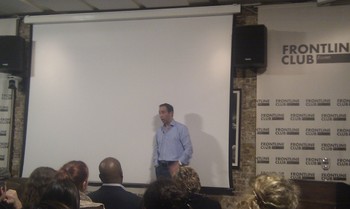U.N Me Screening and Q&A with author Ami Horowitz
By: Ivana Davidovic
When the United Nations was founded after World War II it embodied the world’s hopes for a more peaceful and just world. Since it’s noble founding, wars and human rights abuses have continued unabated, throwing a spotlight at the UN’s role in keeping the peace and building a fairer world for all.
Has the UN managed to stick to its founding principles?
The US documentary maker Ami Horowitz went on a search for some answers in his harrowing and sometimes darkly humorous documentary U.N. Me.
Featuring interviews with with former U.N. ambassador John Bolton, former CIA Director James Woolsey, former U.N. weapons inspector Charles Duelfer, Nobel laureate Jody Williams, and others, U.N. Me exposes incompetence, denial and corruption at the highest levels of the organisation.
From the corruption-tainted Oil for Food Programme in Iraq to the catastrophic and deadly unwillingness to intervene in Rwanda and Darfur, Horowitz portrays the UN more as a clubhouse for the dictators and tyrants who sit on its various Councils, than the world’s most distinguished humanitarian organisation.
Not everyone at the Frontline Club’s screening agreed with Horowitz’s analysis and the author was subjected to some vigorous questioning during the Q&A session.
One member of the audience likened Horowitz to Ali G, the satirical character invented and performed by Sacha Baron Cohen, wondering whether it would have worked better to adopt a more serious approach when questioning, for example, a Sudanese Ambassador.
Horowitz responded:
“Politicians are trained to avoid the questions directly or just to lie. He spent about five to seven minutes talking about nothing relating to the questions, I had unusable video. I would have loved to have made a straight up documentary of real power all the way through, but I am a slave to the market and the market wants something a little bit comical at times.”
There was also strong criticism from another member of the audience who dismissed the film as a “US-Republican pro-Israeli critique of the UN – a piece of propaganda,” that did not focus sufficiently on Israel or America.
Horowitz defended his editorial decisions, however:
“When you weigh the problem of Israel, he UK and the US with what Sudan, North Korea and Iran are doing, I think it is a fairly simple conclusion who’s worse. These are some of the worst players. These are evil governments. North Korea – it’s a gulag. Would you not agree with it?”
Several current and former UN workers among the audience were more positive about the film. Responding to suggestions that there should be more detailed analysis of why the UN behaved the way it did and possible solutions, as well as an examination of the “total immunity and impunity as UN staff are outside of all national laws,” Horowitz said:
“We made a difficult decision not to talk about the solutions, for several reasons. You make a 90 minute movie and you can’t give that sort of a subject 15 minutes at the end. We tried and it sounded trite.
I want people to feel empowered, upset and to come up with their own way of solving the problem.
I am very much split. I am not one of those who calls for eradication of the UN. I think it should pursue the vision and the values from its charter."
